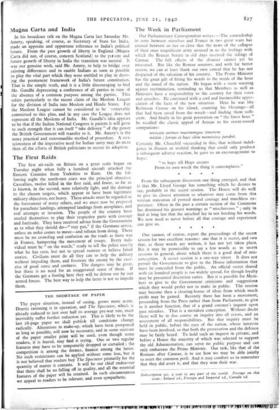One cannot, of course, report the proceedings of the secret
session for two excellent reasons: one that it is secret, and two that, as these words are written, it has not yet taken place. But it may be permissible to say a few words as to secret sessions in general, about which there is a good deal of mis- conception. A secret session is a one-way street. It does not permit the Government to give to the House information that must be concealed from the public. An official secret shared with six hundred people is too widely spread, for though loyalty may be presumed discretion varies. But it is possible for Mem- bers to give to the Government criticisms and suggestions which they would prefer not to make in public. The session may become then a clearing-house of ideas from which much profit may be gained. Recently there has been a movement, proceeding from the Press rather than from Parliament, to give to it another function, that of a grand coroner's inquest upon past mistakes. That is a mistaken conception. Without doubt there will be in due course an inquiry into all errors, and an assessment of all responsibilities. But that inquiry must be held in public, before the eyes of the nation, whose interests have been involved, so that both the prosecution and the defence may be fairly heard. To hold such an inquest in private, and before a House the majority of which was selected to support the old Administration, can serve no public purpose and can only embarrass the Prime Minister. Our task, like that of the Romans after Cannae, is to see how we may be able jointly to avert the common peril. And it may comfort us to remember that they did avert it, and that they won their war.






























 Previous page
Previous page